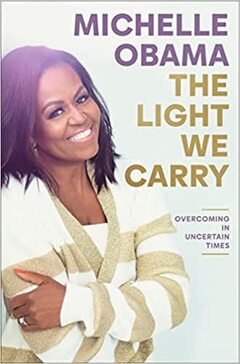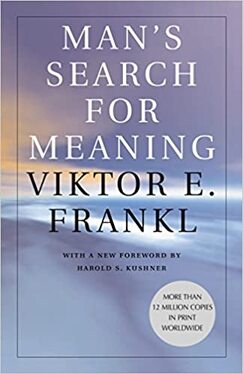 I actually started Man's Search For Meaning by Viktor Frankl last year and just got around to finishing it. This book can be found on many must-read lists, and I wanted to be sure to read this one after reading The Choice, which was probably the best book I read last year (and an especially humbling read during the pandemic). Frankl talks about his time in Nazi concentration camps and his exploration into what truly drives humans, which isn't pleasure, but meaning. Most people will be inspired by reading this book, it certainly stands the test of time. 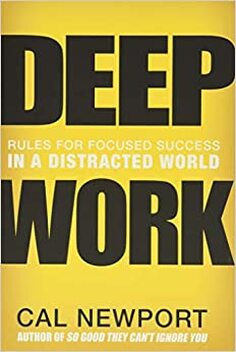 Deep Work by Cal Newport was a quick read and a nice reminder about what type of work will continue to be more and more valuable in the 21st century. The book lays out strategies for achieving deep work, and I was surprised to realize as I was reading how often I don't notice my preference for swapping out deep, thoughtful work with shallow activities. Deep work is the ability to focus without distraction on a cognitively demanding task. It allows you to master complicated information, produce better work and ultimately feel more fulfilled. I see more and more remote-first companies making a case that deep work and ultimate productivity can be achieved best outside of an office (or especially not in an open office plan). This is a good company read or for anyone who's looking to gain better results and more progress in less time in their life and career. 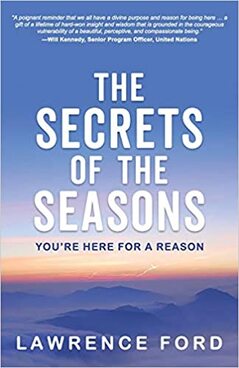 A friend of mine knows Lawrence Ford, the author of The Secrets of the Seasons, so I picked this up and it was a quick read. This book was about how to "wake up" to the true meaning of life and understand that everyone is here for a reason. Ford explains that everyone goes through different seasons throughout their lives and that understanding them will help you achieve fulfillment and come to find what you're meant to be doing on this earth. I've read a lot on the topic of spirituality, religion and consciousness, so I was already primed to take in this info and found some good nuggets in there that were inspiring. There were some nice reminders for me about the connectivity of everyone and everything on earth and how to move past the brain and tap into the spirit and energy that's around and a part of us everyday. The structure of the book was sometimes confusing to me but I did like how he used the book to offer a lot of his life story and path to discovering the 'secrets of the seasons." 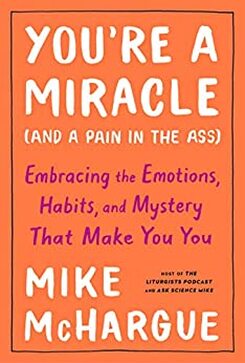 I just finished Mike McHargue's latest book You're A Miracle (And A Pain In The Ass). I learned about Mike McHargue, or Science Mike, from Pete Holme's podcast. The only reason I grabbed this quick read was because I was interested in learning more about Science Mike. For some reason, his troubled past intrigues me. I also like his style and how he breaks down complex subjects into digestible chunks that actually make sense. This book was part memoir, part science in layman's terms, part self-help book. The book had some good nuggets in it and McHargue used his own story to help get to the core of what he was trying to say. I'm probably not the core audience for this book, but because I know who McHargue is I was interested and read the whole thing and mostly enjoyed it. Throughout the book I sometimes felt a little disconnected with the main point McHargue was trying to make (or was it that he wasn't trying to make a specific point at all?) There were some interesting scientific studies and data in here, that help to comprehend why we do the things we do and how we can move toward self acceptance and positive change. 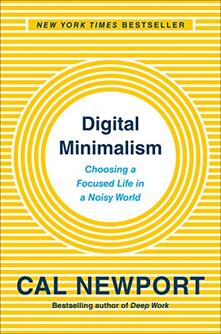 I picked up Digital Minimalism by Cal Newport, another book I thought was a timely read while spending more time at home (and being tempted to check my phone a million times a day, getting stuck in an endless Facebook loop, reading news and posts about Coronavirus that were only giving me anxiety). In this book, Cal lays out a proposition, based on a philosophy that seeks to reexamine the role technology plays in our life: take a complete break from your digital world (outside of the necessities and work of course) for 30 days. Then, slowly reintroduce devices and apps back into your life in an effort to be intentional about how you spend your time in front of phones, screens and social media. I didn't cut out digital for 30 days, but seeing as I already consider myself to lean toward the minimalist end of the digital spectrum anyways, while reading the book I took about a week to stop using social media and set a schedule to check my email and texts during the day. Cal laid out a good vision with some good research behind it that reminded me that we can and should be intentional about using our phones and other digital apps, especially now that we have the ability to carry supercomputers in our pockets everywhere we go. Cal's philosophy might sound extreme and anti-technology to some, but it's not. The goal isn't to reject the age of the internet, but rather reject the way we currently engage with these tools. It takes effort to control our digital lives so that we can reach our potential and use technology to actually make our lives better. Instead of being owned by our technology, Cal urges us to decide for ourselves what tools we want to use, for what reasons and under what conditions. This was a short and good read and I think an important one for anyone serious about personal and career growth and development. 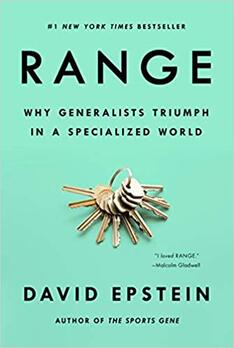 I enjoyed reading Range by David Epstein. It was filled with interesting research and stories, all lending itself to the idea that early and intense specialization is not always a good thing. This is a must read for parents, coaches, soon to be or recent college grads and anyone in the world of business or sports. Epstein gives a well supported case for breadth of activities and not being afraid of getting a late start. This means no need to force your kid into one sport at age 4 so he/she doesn't fall behind, it means college students don't have to know exactly what they want to do and will actually be of more value to the world if they get a variety of experiences and take detours, and it means generalists can be more innovative in a particular field than those who have specialized solely in said field. Experiment, take detours, learn from a variety of sources, don't aim for efficiency perfect focus all the time. This is a breath of fresh air from Epstein in an ever more specialized and focused world. 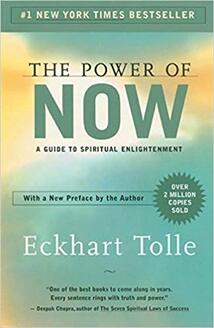 I read The Power of Now by Eckhart Tolle, a recommendation from Pete Holmes. This book may seem a little out there to some, but it really has stood the test of time, it was first published in 1997. I definitely read it at a time and place in my life where it really resonated with me. I enjoyed reading Singer's The Surrender Experiment, which made me interested in the idea and practice of meditation. But it wasn't until I read The Power of Now that I actually understood what the goal of mediation truly is and how to get there. Meditation, ancient wisdom and philosophy, religious teachings - they all get you to the true goal, which Tolle says is full consciousness and enlightenment. Tolle makes an effort to get you there by teaching how to exist in the present moment and no longer identify with the mind, which causes thought to become compulsive. This incessant mental noise is normal (and unnoticed) among most people and is what blocks the discovery of inner stillness that is your true self, your Being. This book can be read and enjoyed with or without a religious background. For anyone who is interested in mindfulness and stillness, this is a must read. The mindfulness trend that seems to be all around us in the U.S. right now is good and necessary but sometimes feels superficial in my opinion. I understand the rejection and decrease in the practice of religion in our current times (I'm speaking of my observation in America since I live here), but there still must exist a way to "access" the one spiritual teaching that every religious and spiritual leader in history seems to be pointing us to. Tolle is a great start before diving into any specific teachers such as Buddha or Jesus, as well as a good read for anyone currently practicing/following a particular religion. 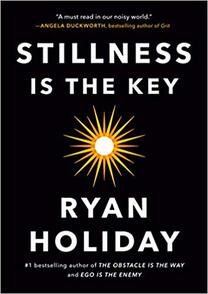 Stillness is the Key is Ryan Holiday's latest book and while I'm a huge fan of his this is the first book he wrote that I actually read from front to back. This was a quick and inspiring read, filled with references and stories from historical greats. I must admit that since I'm in the middle of reading other spiritual and religious texts (my rabbit hole on this topic that I still haven't gotten out of), this book felt less important to me as I'm so deep in the weeds of material that's teaching stillness and inner peace. With that said, everyone should try reading at least one of Holiday's books, he's super well read and therefore does a great job at putting together something worth reading. Holiday says himself in the book that he wrote this as a first step on the journey to wisdom; an introduction to classical thinking and history. He urges everyone to continue on the path of finding wisdom and stillness through other texts and looking inward. Stillness, according to Holiday, means to be steady while the world spins around you. To act without frenzy. To hear only what needs to be heard. To possess quietude - exterior and interior - on command. Buddhism, Stoicism, Epicureanism, Christianity, Hinduism and more have all gotten people to this stillness, the key to elite performance and a happy life. Holiday references all of these ancient wisdoms, as they all agree that this stillness is what everyone should look to achieve in life. 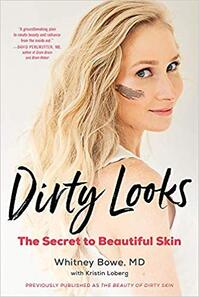 I read Dirty Looks: The Secret to Beautiful Skin by Whitney Bowe after hearing her on the Atomic Moms podcast. If you're looking for better skin and to be all around healthier, this is a decent and informative read, and Bowe even lays out a plan to follow to get there. I wasn't looking for a specific plan to follow, so I was able to quickly read through some of this. Lately I've been interested in gut health and Whitney shed light into how the body works and how to glow from the inside out. Spoiler alert - everything in the body is connected and the stomach and intestines control much more than you may think. Getting back to basics, plant based foods, less processed foods, moving/exercising and protecting yourself from the sun won't just make you look good but will help you live longer and feel better. If you don't need all the details a book can provide, the Atomic Moms episode is here. |
AboutLiteracy is a prerequisite for freedom. Read deeply. Read what matters. Build a reading list. Don't take literacy for granted. Categories
All
|
